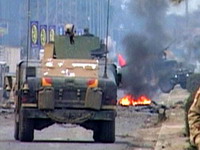Shiites try to reconcile with Sunnis in Iraq
Trying to reconcile, a leader from Iraq's largest Shiite visited Sunday the Sunni Anbar province, where he delivered a message of unity to tribal sheiks who have staged a U.S.-backed revolt against al-Qaida militants in their region.

The visit by Ammar al-Hakim, son and heir apparent of Iraq's top Shiite politician, provided the latest evidence that key Iraqi politicians may be working toward national reconciliation independently from Prime Minister Nouri al-Maliki's government, which has faced criticism for doing little to iron out differences between the country's Shiites, Kurds and Sunnis.
Sunni Arab Vice President Tariq al-Hashemi visited Grand Ayatollah Ali al-Sistani, Iraq's top Shiite cleric, last month at the holy city of Najaf south of Baghdad. The visit amounted to an unprecedented Sunni Arab endorsement of al-Sistani's role as the nation's guardian.
Al-Hashemi's Iraqi Islamic Party also has been distancing itself from militant Sunni Arab groups and has in recent months forged closer ties with al-Hakim's Supreme Islamic Iraqi Council, the country's largest Shiite party, and the two major Kurdish parties.
Iraq's Shiite account for about 60 percent of Iraq's population, while the Sunni Arabs and the mostly Sunni Kurds combine for most of the remainder.
On Sunday, al-Hakim struck a note of national unity in Anbar, where a tribal revolt has significantly reduced violence in the vast province and inspired similar anti-al-Qaida uprisings elsewhere in central Iraq and Baghdad.
Al-Maliki's government has grudgingly supported the uprisings, but has expressed concern that the news Sunni militias must operate under its control.
"Iraq does not belong to the Sunnis or the Shiites alone; nor does it belong to the Arabs or the Kurds and Turkomen," al-Hakim, who is being groomed to take over the helm at the Supreme Council, told his hosts in the provincial capital Ramadi, 115 kilometers (70 miles) west of Baghdad.
"Today, we must stand up and declare that Iraq is for all Iraqis," said al-Hakim, son of Abdul-Aziz al-Hakim, who was diagnosed with cancer last May and has been receiving chemotherapy treatment in neighboring Iran.
"We stand together in one trench to defeat Iraq's enemies," al-Hakim said, with his host, leader of the Anbar movement Ahmed Abu Risha standing next to him.
The movement's founder and Abu Risha's brother, Sheik Abdul-Sattar Abu Risha, was killed in a bombing on Sept. 13.
Al-Hakim later led officials from his party and dozens of Anbar sheiks in prayer, a significant display of religious unity.
Al-Hakim's visit to Anbar is a landmark event given the sectarian tensions that have bedeviled Iraqi politics since the 2003 overthrow of Saddam Hussein's Sunni-led regime. Violence between Shiites and Sunnis, much of which is blamed on militias linked to major Shiite parties as well as Sunni insurgents, has claimed thousands of lives in the past two years alone.
SIIC is the closest of Iraq's Shiite parties to Iran, a fellow majority Shiite nation that is anathema to the Sunni Arabs and Iraq's enemy in a ruinous 1980-88 war.
The Supreme Council was founded in Iran in the early 1980s and the al-Hakims lived in Tehran for close to two decades before they returned home soon after the U.S.-led invasion in 2003.
A notorious Shiite militia, the Badr Brigade, is affiliated with the Supreme Council and is blamed for the assassination of Sunni Saddam loyalists and hard-line clerics. The man thought to be its leader, lawmaker Amer al-Saadi, was in Ramadi Sunday with al-Hakim.
Iraq's Shiites and Sunnis are at sharp odds over a host of major issues and the visit by al-Hakim, who wears clerical robes and a black turban, to the Sunni heartland could create goodwill, but may not be enough to resolve differences.
The visit, which received wide local media coverage, may have been motivated in part by the young leader's wish to leave his mark as he proceeds to establish his credentials as the de facto leader of the senior party in parliament's largest bloc, the Shiite United Iraqi Alliance.
Subscribe to Pravda.Ru Telegram channel, Facebook, RSS!




